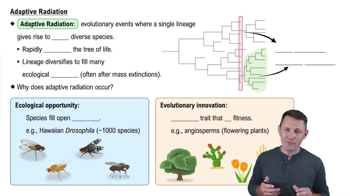Many species of animals on islands are larger than related species on the mainland. Scientists hypothesize that this phenomenon, called island gigantism, evolved in response to the scarcity of competitors and predators on islands. Reduced competition and predation allow species to exploit more resources and free them from the need to hide in small refuges. Which of the following might be a trade-off of gigantism experienced by giant island tortoises?
a. They cool very rapidly during cold weather.
b. It would be difficult to sustain their high mass-specific metabolic rates on a diet of plants alone.
c. It could be more difficult to avoid thermally unfavorable conditions.
d. They could hide from nonnative predators more easily.





